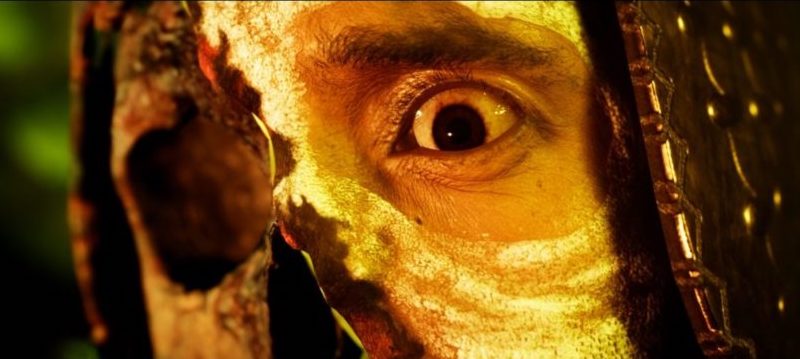A screenshot from House of Ashes, which Lydia worked on
Hi Lydia, great to speak to you again – how are you finding life in the Games industry?
“It feels like a lifetime ago when we first spoke! I remember my university experience being positive, as we were kind of like a big nerdy family, and being at work has been the same, if not even better. Everyone I work with has been kind, ready to teach me what they know, and I've made many lifelong friends already. When I was a junior designer, I was working on House of Ashes, mostly on the bugging phase of game development, and when I held the physical copy in my hand, I shed a little tear. I felt like all the effort from university had been totally worth it. I’m still fresh in the industry but if the rest of my career carries on like it has started, then I'm looking forward to the years ahead.”
So, what’s a typical “day in the office” like?
“A typical day in the office usually starts with a few scrums in the morning (not the rugby ones, that’s what we call our morning meetings), then normally, I'd continue to work with camera/animation/audio to design and create the cinematic scenes that Supermassive are famous for. Currently, my time is split between pre-production design duties and being on motion capture shoots. Sadly, I cannot say much more, as what I’m working on hasn’t been announced yet… But there is never a dull day in the office for sure!

Lydia Beharrell
What projects have you worked on so far, and can you tell us about any current or upcoming projects?
“I haven't worked on many projects. Because the games that Supermassive create are branching narratives that take a few years to develop, the only released one has been House of Ashes, which was an absolute blast to work on. Seeing twitch streamers play it, and even friends post on their social media that they've been playing it, was such a high point in my career so far.
“I can’t say what I'm working on currently. It's the curse of game dev, when you have all this cool work and want to show it to the world but are under strict NDA policies. I can say that it's super cool, scary and I cannot wait till I can finally talk about it.”
How did you come to work for Supermassive – was it a tough application process?
“I found an opening through looking at the different game companies around my area. Went to their careers page and saw they had a position for Cinematic Designer open. At the time, I did not have the experience to fill the role, at all. I honestly just thought, ‘the worst they can say is no’, so I applied and wrote a passionate cover letter. After two weeks I assumed nothing had come of it, but I received an email asking if I wanted to come to an interview.
“They asked me a lot of problem-solving questions and about my experience that I’ve collected before and during university, which wasn’t a lot (as most uni students would agree). Also, because it was during the second lockdown, I had my interview through zoom, which was an odd experience. Thankfully, they saw my passion for designing games, love for horror and they liked my portfolio. Due to my lack of experience, they placed me in a Junior Designer role instead of the Cinematic Designer one I went for, and since then I have been promoted to Designer and have learned so much.
“If I can give any advice, it would be to always apply for the jobs you want, even if you don’t have the experience or you’re not qualified - you never know what might happen!”
What skills did you learn at UCA that you’re still using today in your job?
“Well, nothing can truly prepare you properly for working in a game dev studio. There is so much you learn along the way and everyday teaches you something new, whether it's a way to fix a bug, a keyboard shortcut for Unreal or how best to work with your colleagues.
“That being said, UCA definitely helped prepare me for the real world, and I don't think I would be where I am now without it. It gave me the confidence in the software that we use, in the ability to present my ideas/changes in a professional manner, and the faith to trust the process. You cannot get bogged down every time a piece of code doesn't work, or someone finds a hole in your story. UCA taught me how to bounce back after mistakes, which is a very valuable commodity to have, and I will always be thankful for my time there.”

Above, another screenshot from House of Ashes, which Lydia worked on
Finally, Lydia, knowing what you know now, what advice would you give to current UCA games students.
“Oh I guess there’s a few things. First, make a bunch of video games, make sure people can play them, make sure they are in your portfolio and apply for positions, even if you are not qualified for them.
“Create as much as possible, even if it's not great, and a little buggy. Just create and release to the world!
“I’d say keep your projects small – a lot of small projects show range and present achievable goals. Some of the most impressive portfolios that I've seen don't have any Unreal on them at all, but a lot of Twine and Bitsy.
“As a last tip, have hobbies/interests that are outside of video games. Having passions that are different from what you do 9-5 will not only help with burn out and give your brain a break from your every day, but also will inspire your game dev in so many different ways.”
If you’re interested in studying games at UCA, check out our course pages.
/prod01/channel_8/media/marketing-media/blog-imagery/1634825497_161_The-Dark-Pictures-Anthology-House-of-Ashes-review-Saving.jpg)